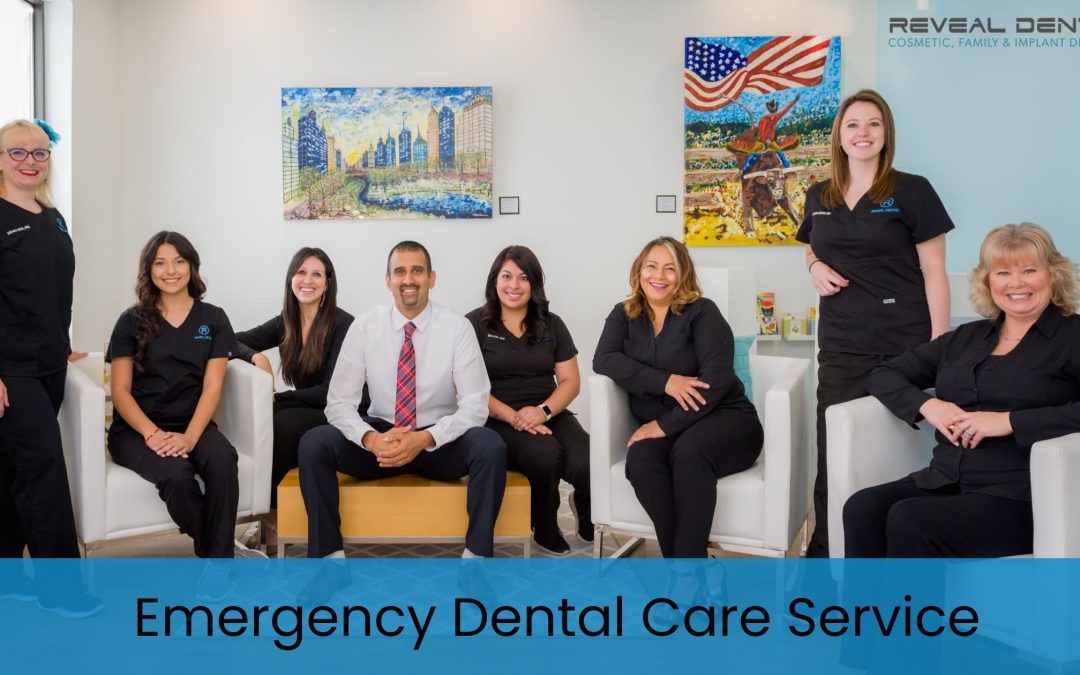When it comes to your dental health, emergencies can strike unexpectedly, causing discomfort and anxiety. This is why understanding the different types of dental emergencies, and having a plan to deal with them, is crucial for timely intervention and effective dental care. Various scenarios qualify as dental emergencies, and more importantly, the advantages of having a plan before you need an emergency dentist in Cedar Park are critical.
When dealing with a sudden toothache or a traumatic injury, knowing what constitutes a dental emergency and the benefits of prompt emergency dental services can make a significant difference in preserving your oral health.
Different Types of Dental Emergency Services
Dental emergency services encompass a range of immediate care and interventions to address urgent oral health issues. Here is a list of common dental emergencies –
1. Relieving Severe Toothaches
Providing immediate evaluation of tooth pain and treatment to alleviate severe toothaches caused by various issues, such as cavities, infections, or dental trauma. Emergency dental services focus on diagnosing the source of the toothache, prescribing pain relief medications, and initiating preliminary treatments to address the underlying cause.
2. Conducting Emergency Extractions
Performing the removal of a severely damaged or infected tooth that cannot be saved through other dental procedures. Emergency extractions involve swift action to provide pain relief from a broken tooth, and you will receive post-extraction care instructions to ensure the proper healing of the extraction site.
3. Managing Dental Abscess
Draining and managing dental abscesses, which are localized collections of pus that can cause severe pain and swelling. Emergency dental care for abscesses involves incision and drainage, the prescription of antibiotics, and follow-up appointments to monitor healing and prevent recurrence.
4. Repairing Chipped or Fractured Teeth
Restoring teeth that have been chipped, fractured, or broken due to trauma or other accidents. Emergency repairs may include dental bonding, veneers, or dental crowns to restore the tooth’s structure and protect it from further damage.
5. Reattaching Knocked-Out Teeth
Initiating immediate reattachment efforts for teeth that have been completely knocked out, increasing the chances of saving the tooth by broken dental restoration. Proper handling, preservation, and swift reattachment procedures are crucial in preserving the natural tooth and promoting successful reintegration.
6. Managing Soft Tissue Injuries
Evaluating and treating injuries to the lips, gums, tongue, or cheeks, including controlling bleeding and promoting healing. Emergency dental care for soft tissue injuries involves sutures, topical medications, and guidance on at-home care to minimize discomfort and facilitate recovery.
7. Conducting Emergency Root Canal Treatment
Initiating immediate root canal therapy to address severe infections or inflammation within the tooth’s pulp, relieving pain and preserving the tooth. Emergency root canal procedures focus on removing infected tissue, disinfecting the root canal, and sealing the tooth to prevent further infection.
8. Replacing Lost Fillings or Crowns
Promptly replacing or repairing dental fillings or crowns that have become loose or fallen out. Emergency dental care includes assessing the tooth’s condition, addressing any underlying issues, and providing temporary or permanent restoration to protect the tooth.
9. Adjusting Orthodontic Appliances
Performing emergency adjustments or repairs for broken braces, wires, or other orthodontic appliances causing discomfort or issues. Orthodontic emergency services aim to address immediate concerns, prevent further problems, and maintain the progress of ongoing orthodontic treatment.
10. Treating Broken or Dislodged Dental Implants
Evaluating and managing issues related to dental implants, such as fractures or dislodgment. Emergency care for dental implants may involve stabilization, assessing implant integrity, and recommending further treatment to restore the implant’s function.
11. Addressing Persistent Bleeding
Taking immediate measures to address persistent bleeding after dental procedures or due to trauma, ensuring proper clotting and wound healing. Emergency dental services include applying pressure, using hemostatic agents, and providing guidance on post-treatment care.
12. Managing TMJ (Temporomandibular Joint) Issues
Assessing and initially managing temporomandibular joint issues causing pain, discomfort, or limited jaw movement. Emergency care for TMJ issues may involve pain management, offering lifestyle recommendations, and referring you for further evaluation by specialists if necessary.
13. Conducting Emergency Dental X-rays
Immediately taking dental X-rays to assess the extent of dental emergencies and aid in accurate diagnosis and treatment planning. Emergency X-rays help dentists visualize hidden issues, plan interventions, and ensure comprehensive care for your specific dental emergency.
14. Providing Pain Management and Palliative Care
Offering pain relief measures and palliative care to alleviate discomfort until a comprehensive treatment plan can be implemented. This may include prescribing pain medications, applying topical aesthetics, or taking other measures to enhance your comfort during an emergency dental visit.
Major Advantages of Emergency Dental Care
The benefits of quickly seeking dental emergency services in many cases will assure you a better outcome. Reasons to consider emergency dental care promptly when in need –
1. Immediate Pain Relief
One of the most significant advantages of emergency dental care is immediate pain relief. Dental emergencies often come with intense pain, and prompt intervention can alleviate discomfort and provide much-needed relief. You won’t have to endure sleepless nights or prolonged agony.
2. Prevention of Further Damage
Addressing a dental emergency promptly helps prevent further damage to your teeth, gums, and surrounding structures. Timely intervention can often save a tooth that might be at risk due to trauma or infection, preserving your natural smile.
3. Enhanced Treatment Success
The sooner you seek emergency dental care, the higher the likelihood of successful treatment outcomes. Whether it’s reattaching a knocked-out tooth or stabilizing a fractured tooth, early intervention plays a crucial role in achieving optimal results.
4. Reduced Risk of Complications
Dental emergencies, when left untreated, can lead to complications that extend beyond the oral cavity. Infections can spread, causing systemic issues and affecting overall health. Emergency dental care mitigates these risks, ensuring localized problems don’t escalate.
5. Customized Treatment Plans
Emergency dental care allows for a personalized and targeted approach to address your specific dental issue. Dentists can tailor emergency dental services based on treatment plans as per the nature and severity of the emergency, ensuring effective and efficient solutions.
6. Preservation of Oral Function
Dental emergencies can compromise your ability to chew, speak, and carry out daily oral functions. Seeking emergency care helps restore and preserve these essential functions, allowing you to go back to your routine with minimal disruption.
7. Minimized Recovery Time
Early intervention in dental emergencies often leads to minimized recovery times. By addressing the issue promptly, you reduce the risk of complications and expedite the healing process, getting back to your normal life faster.
8. Improved Aesthetics
Dental emergencies, especially those involving visible teeth, can impact your smile aesthetics. Emergency dental care not only addresses the immediate issue but also focuses on restoring the appearance of your teeth, ensuring your smile remains confident and vibrant with emergency dental services.
Conclusion
Understanding the different types of emergency dental services while recognizing the advantages of emergency dental care is essential for protecting your oral health. By prioritizing prompt intervention, you reduce tooth pain while preventing further damage and also prepare for efficient dental treatment outcomes. It is important to remember, that in dental emergencies, your treatment duration matters.
Be proactive, know where you are going to turn for emergency dental care and prepare yourself to face unexpected dental challenges with resilience. Your smile deserves the best, even in the face of unforeseen dental emergencies!

Submitted by Dr. Alkesh C. Sura
Dr. Alkesh C. Sura is the founder and lead dentist at Reveal Dental in Cedar Park, Texas. A North Carolina native, Dr. Sura earned both his Bachelor of Science in Public Health and Doctor of Dental Surgery degrees from the University of North Carolina at Chapel Hill.


